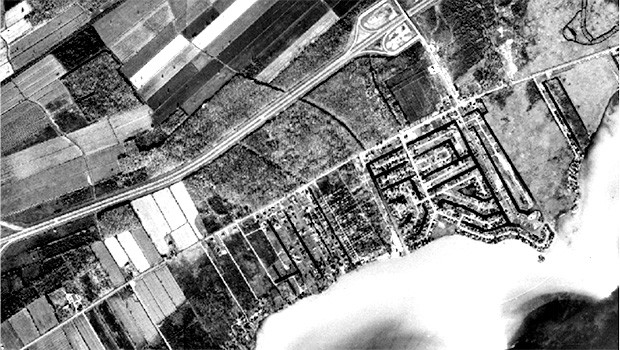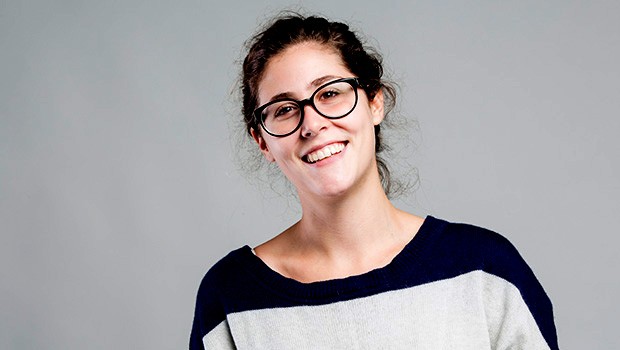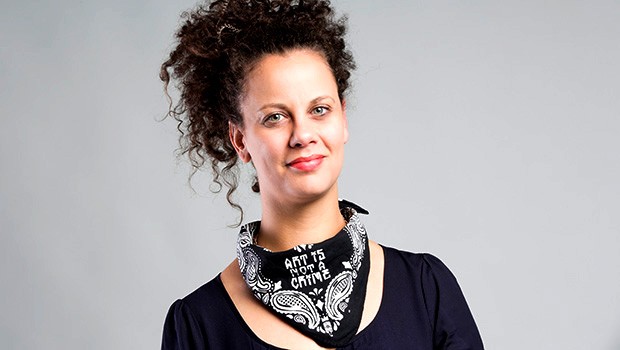Award-winning undergraduate research
 Human Environment student Frances Amyot examined aerial photos of Saint-Zotique’s canal system as part of her work to find the reason behind the recent accumulation of sediment in the area.
Human Environment student Frances Amyot examined aerial photos of Saint-Zotique’s canal system as part of her work to find the reason behind the recent accumulation of sediment in the area.
Whether it’s crunching data that will provide insight into the reputation of a business or working in the field with municipal governments to tackle environmental issues, Concordia undergraduates are gaining valuable experience through research opportunities.
On the afternoon of Friday, October 16, the atrium of the Engineering, Computer Science and Visual Arts Integrated Complex (EV) will host the second annual Undergraduate Research Showcase. Students from across all faculties will be on hand to display their findings and talk about their work.
This event will highlight winners of the 2015 Concordia University Student Research Awards (CUSRA) as well as recipients of the Natural Sciences and Engineering Research Council of Canada (NSERC) Undergraduate Student Research Awards.
The goal of these awards is to bolster interest in all kinds of research that complements undergraduate coursework. The experience is designed to prepare students for graduate studies or research careers.
For Management student Matthew Samberg his project was not only a way of developing skills related to academic research, but also the chance to be mentored by a faculty member in his field. “Though we learn a lot in class — working one-on-one with a professor for four months on a specific project is like learning on a higher level,” he says. “I gained added insight into the subject matter and research methodology that is impossible solely in the classroom.”
Here is a look at three projects that will be on display on October 16.
 Frances Amyot, Human Environment and Western Society and Culture, Faculty of Arts and Science.
Frances Amyot, Human Environment and Western Society and Culture, Faculty of Arts and Science.
Toward sustainable river management
Municipalities bordering rivers spend a lot of resources ensuring water is accessible and clean. Officials in Saint-Zotique, Quebec, have been dealing with the particularly difficult problem of sediment accumulation in their canal system — making management of their river a challenge.
This summer, Frances Amyot — who's enrolled in a double major in Human Environment and Western Society and Culture — worked with the municipality and other agencies such as Hydro Québec to shed light on why so much sediment is accumulating in the canals.
Supervised by Pascale Biron, a professor in the Department of Geography, Planning and Environment, Amyot started by studying aerial photos of the canals over a 70-year span. She interviewed stakeholders to understand what they thought could be causing the problem. In her fieldwork she used sonar technology coupled with a Global Positioning System (GPS) to measure the depth of the sediment.
The goal is to create a comprehensive map that will allow the municipality to get a complete picture of the challenge at hand.
 Christina Marie Phelps, Art Education, Faculty of Fine Arts.
Christina Marie Phelps, Art Education, Faculty of Fine Arts.
The transformative power of “task”
New methods in art education are changing the way people learn. For Christina Marie Phelps, a student in the Art Education program, this means exploring her own teaching practice where she approaches art making with people of all ages through a novel approach known as “TASK” — an educational format that encourages creativity, play, interaction and improvisation.
Her research involves the creation of a jointly authored multimedia article with her supervisor — Kathleen Vaughan, an associate professor in the Department of Art Education — exploring both the teaching and learning potential embodied in a 10-day summer intensive class facilitated by TASK creator Oliver Herring.
The goal of the research is to contribute to the nascent understanding of popular contemporary art practices and how these can impact education and community engagement.
 Matthew Samberg, Management, John Molson School of Business
Matthew Samberg, Management, John Molson School of Business
Understanding the data behind business reputation
For businesses, a good reputation is seen as key to long-term success. To appreciate how corporations gain their reputations, it is vital to understand stakeholders’ attitudes toward a firm, which is based on their expectations relative to other companies.
Building on the work done in the area of corporate reputation by his supervisor, Peter Jaskiewicz, and a former CUSRA program participant from 2014, Matthew Samberg was tasked with coding and entering data on family business giant Seagram’s. He did this by compiling articles that mention the company and sorting them into different categories (known as nodes) related to reputation.
Getting a picture of how Seagram’s is written about — from firm growth to new products — allows Samberg to gain a deeper understanding of how the business is perceived and what this means for its long-term growth.
Find out about undergraduate research opportunities.